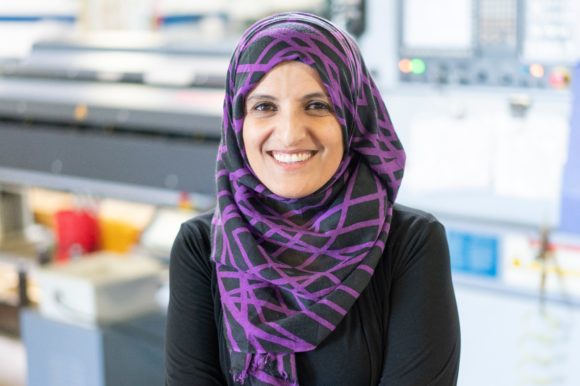Pioneer Service employs a diverse group of people—varying age groups and genders, African Americans, Latinos, and a few old white guys, too. Twelve of its 31-person workforce are women. The diversity provides the company with a great pool of talent and creates a special work environment.
Today’s podcast is part two of my interview with Aneesa Muthana, co-owner and president of Pioneer Service Inc., a thriving Swiss machine shop in Addison, Illinois.
Aneesa says that even with such a unique, diverse workplace, her company still deals with the problem of its people forming cliques, which can hurt their ability to work together.
Like in every organization, cliques emerge based on variables such as cultural backgrounds, job types, and seniority. Aneesa copes with this problem by demonstrating to her employees that she has equal respect for everyone.

She likes to spend time with employees on the shop floor, devoting the same amount of her time to everyone—people of all job types, seniority, etc. She passes out water bottles on a hot days. She learns about people’s lives. She wants to show them that she cares about them and they aren’t just a number. She even tries to reveal some of her own vulnerability.
Aneesa says she recognizes that people naturally gravitate to others with similar jobs or backgrounds. What she wants is for employees to listen to each other with respect and cooperate when they come together in the huddle.
She says her best employees almost always come from referrals by current or past employees, because employees who have already been successful at the company usually bring in people whose personalities and abilities fit with the company’s culture.
I asked Aneesa if she had any advice for a machining company that was having trouble finding good people—a company unlike hers that didn’t have a base of strong employees who could bring in others like themselves.
She chuckled and suggested the company should join the Precision Machined Products Association (PMPA), of which she soon will be president. She says that peers in the organization guided her to modernize her shop in 2012 when the company had lost 90 percent of its business. She marveled at the unique cooperation the organization fosters amongst its members, who sometimes are direct competitors.
Companies are capable of great things when people respect each other in the huddle.
Question: Do you wish your workplace were more diverse?
Podcast: Play in new window | Download





1 Comment
Aneesa is a people person with many unique skills and tenacity making her a recognized leader of the metalworking industry.
Noah, thank you for producing these diverse Podcasts.
One of my first assignments in the US at age 23 in 1962 was to train the staff at Westclox in Gadsden, Alabama. Anybody above the machine operators was white! My boss did mention to me before leaving to concentrate on my job, show no emotions and keep my mouth shut.
Glad he did give me that advice (warning).
Visually things have much improved, it is a blessing that we are unable to read the mind
of some people we work with today on the other hand.
There is no question that many workplaces should be more diverse.
Mind you that I am biting my tongue writing this, working in my teens with musicians and artists left me liberal at my core.
Paul Huber LSME
COMEX